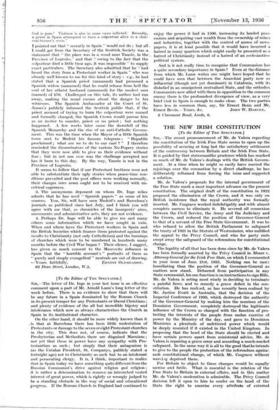[To the Editor of THE SPECTATOR.] SIR,—The letter of Dr.
Inge in your last issue is an effective comment upon a part of Mr. Arnold Lunn's long letter of the week before. There is no evidence to show that there will be any future in a Spain dominated by the Roman Church in its present temper for any Protestants or liberal Christians:; and plenty of evidence of the all but incredible bigotry and intolerance which now as always characterises the Church Mt
Spain in its institutional character. --
On the other hand, it should be more widely known than it . is that at Barcelona there has been little molestation of Protestants or damage to the seven or eight Protestant churches in the city. This does not, of course, indicate that the Presbyterian and Methodists there are disguised Marxians ; nor yet that those in power have any sympathy with Pro- testantism as such ; but simply that their antagonism is (as the Catalan President, Sr. Companys, publicly stated ..a fortnight ago) not to Christianity as such but to an intolerant and persecuting clergy. It is, I think, important to realise that in Spain today we have something quite different from the Russian Communist's drive against religion gull religion ; it is rather a determination to remove an intrenched vested interest of great power, which is rightly or wrongly judged to be a standing obstacle in the way of social and educational progress. If the Roman Church in England had continued to
enjoy the power it' had in 1500, increasing its landed poss- essions* and acquiring vast wealth from the ownership of mines and industries, together with the control of scores _of news- papers, it is at least possible that it would have incurred a hatred in'many quarters which might easily be presented as a hatred of Christianity instead of a hatred of an ecelesiastico- political system. .
And is it not really time to recognise that Comintmism has a quite secondary importance in Spain ? Even at the distance from which Mr. Lunn writes one might have hoped that he could have seen that between the Anarchist party now so influential (though not yet dominant) in Catalonia, with its disbelief in an omnipotent centralised, State, and the orthodox Communists now allied with them in oppoSition to the common enemy there is the profoundest divergence of view, as a very brief visit to Spain is enough to make clear. The two parties have less in common than, say, Sir Ernest Berm and Mr.














































 Previous page
Previous page